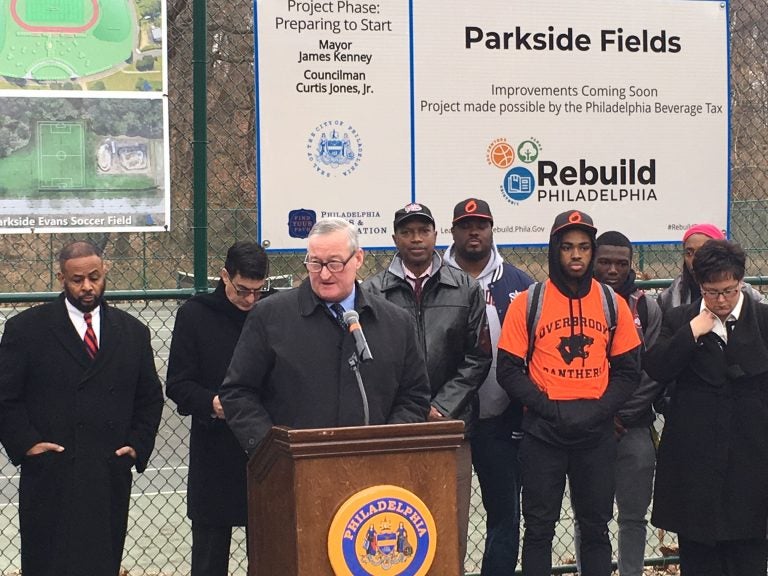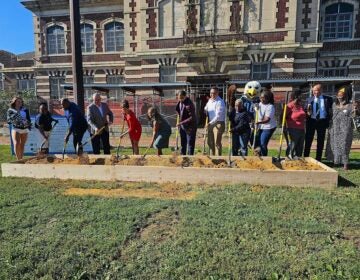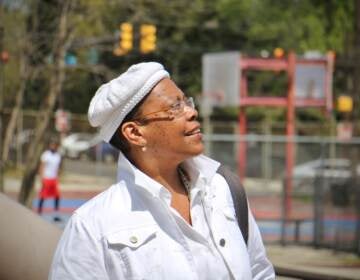Kenney’s ‘Rebuild’ breaks ground on first playground
The $500,000 first phase of the project includes a new practice field beside Parkside-Evans Playground.

Mayor Jim Kenney at the first groundbreaking of his signature Rebuild initiative. (Malcolm Burnley/PlanPhilly)
This article originally appeared on PlanPhilly.
—
Mayor Jim Kenney broke ground Thursday on the first park improvement funded through his signature public works initiative, Rebuild.
Held on a grassy patch of earth near the Mann Center in Fairmount Park, the ceremony marked a long-awaited turning point, not quite three years after the program was first announced.
The $500,000 first phase of the project that kicked off this week includes a new practice field beside Parkside-Evans Playground, along with fencing, drainage, and landscaping. A second phase of the project calls for a football field surrounded by a track.
For the neighborhood of East Parkside where the new fields are under construction, it was a triumphant moment. In the 1940s, East Parkside hosted overflow crowds for professional sporting events, including Negro League World Series games. Today, despite its proximity to West Fairmount Park, the area lacks recreational infrastructure. One youth football team, the Parkside Saints, practice on a makeshift area that results in field goals landing on Belmont Avenue. Overbrook High has mostly lacked any home field to play on.
Dampening the neighborhood’s victory is a growing recognition that Rebuild won’t be reaching as many communities as originally thought. The Kenney administration has revised its projections downward for the overall scope of the project, an outcome that’s been discussed for months following somewhat disappointing returns from the Philadelphia Beverage Tax, which partially funds Rebuild.
“Rebuild will complete as many projects as its budget will allow, which we expect to be roughly 100-125 projects,” Rebuild executive director Nicole Westerman wrote in a statement. “The total number of projects will ultimately depend on how much additional money we can borrow based on beverage tax revenues, how much additional funding Rebuild is able to raise from grants, and the size and cost of future projects.”
Rebuild was conceived as a way of improving between one-third and one-half of all the rec centers, libraries, playgrounds, and parks in the city, of which there are 406 in total. The administration envisioned the bulk of the funding coming from the issuance of $300 million in bonds — in $300 million increments — whose debt service would be paid for with soda tax revenues.
On November 29, the city — via the quasi-governmental body of the Philadelphia Authority for Industrial Development — issued the first tranche of bonds worth $86.5 million, a dip that’s proportional to the downgraded estimates for revenues from the sugary beverage tax. Roughly 12 percent of the tax’s annual revenues are slated for paying off the debt service on the Rebuild bonds. But in its first full year of existence, the controversial revenue-generator raised only $79 million, roughly $9.5 million of which is earmarked for the regular debt service the city will be required to pay on account of the bond borrowing.
The average annual debt service on this first tranche of bonds will be approximately $6.8 million, according to Westerman.
Yet as city officials grapple with that tight financial reality, they say they are meeting their inclusion goals.
The first construction contract given out — to carry out the plans at East Parkside — was awarded to Gessler Construction, a certified women-owned business based in Media, officials said.
“The team is thrilled that, as the first project to move into construction, this project is expected to meet Rebuild’s goals for minority-owned business participation and exceed Rebuild’s goals for woman-owned business participation,” Westerman wrote.
As outlined in the Request for Proposal, Gessler Construction will be required to submit an Economic Opportunity Plan “to exhaust its best and good faith efforts to reach goals for diverse business inclusion and to employ an appropriate diverse workforce.” The authorizing legislation for Rebuild has put forth inclusion goals of having 45 percent of all workforce hours being completed by minority journeypersons.
WHYY is your source for fact-based, in-depth journalism and information. As a nonprofit organization, we rely on financial support from readers like you. Please give today.







